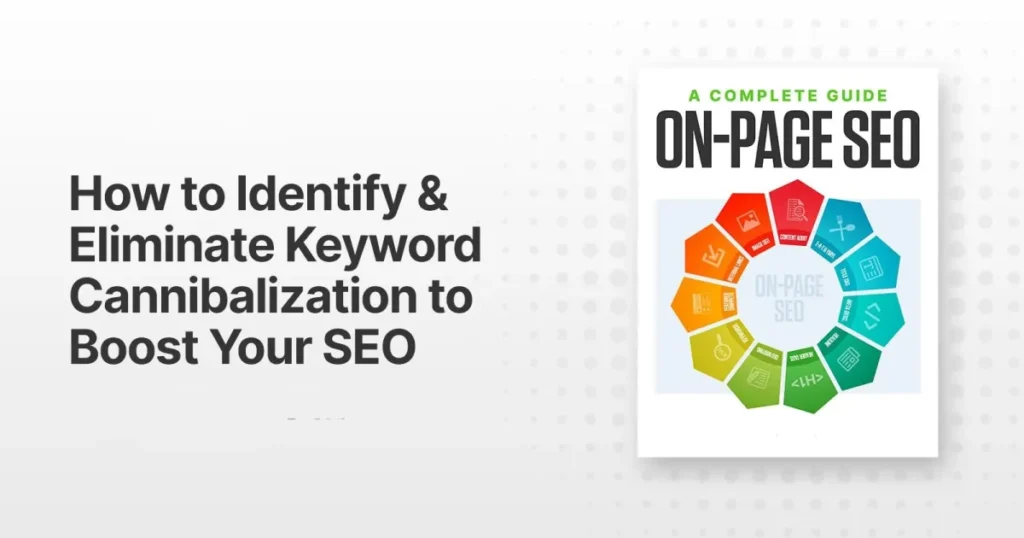
When managing a website’s SEO, targeting the same keyword across multiple pages might seem like a good strategy. After all, more pages ranking for a specific keyword should theoretically increase your visibility, right? Unfortunately, this approach can backfire and harm your SEO efforts. This phenomenon, known as keyword cannibalization, occurs when multiple pages on your website compete for the same keyword, ultimately undermining each other’s potential to rank higher and attract organic traffic.
In this article, we’ll explore what keyword cannibalization is, the negative effects it can have on your SEO, how to identify it, and the best strategies to fix it.
What Is Keyword Cannibalization?
Keyword cannibalization occurs when multiple pages on your website are optimized for the same keyword or keyword phrase. Instead of boosting your site’s overall ranking, this tactic can split your potential click-through rates (CTR), backlinks, and conversions across multiple pages. Essentially, your pages start to compete against each other, which can dilute their overall effectiveness and confuse search engines about which page should rank higher for that keyword.
For example, if you run an e-commerce site selling shoes, and you have several pages targeting the keyword “shoes” without differentiating between different types like “running shoes” or “formal shoes,” you’re not only failing to capture valuable long-tail keywords but also competing against yourself for the broader term “shoes.”

Negative Effects of Keyword Cannibalization
Keyword cannibalization can have several detrimental effects on your website’s SEO:
1. Reduced Page Authority
Instead of consolidating authority into a single, well-optimized page, you’re spreading it thin across multiple pages. This competition within your site diminishes each page’s ability to rank well, resulting in lower visibility overall.
2. Diluted Backlinks & Anchor Text
Backlinks and internal links, which could have strengthened one authoritative page, are instead divided among several pages. This dispersal reduces the overall link equity of each page, making it harder for any of them to achieve a strong ranking.
3. Decreased Relevance
Google may struggle to determine which of your pages is most relevant for a particular keyword, especially if the content on those pages is similar. This can lead to less relevant pages ranking higher, potentially missing out on valuable converting traffic.
4. Wasted Crawl Budget
For larger sites, especially those with extensive product offerings, keyword cannibalization can lead to inefficient use of your crawl budget. Search engines may spend valuable resources indexing multiple pages for the same keyword, which could be better spent on more unique and relevant content.
5. Poor User Experience
Multiple pages targeting the same keyword can signal to users that your content is redundant or lacks depth. This perception can harm user engagement and reduce the likelihood of conversions.
6. Lower Conversion Rates
With multiple pages vying for the same keyword, one page will inevitably perform better in terms of conversions. However, the traffic is split among all the competing pages, leading to missed opportunities for higher conversions.
How To Identify Keyword Cannibalization
Identifying keyword cannibalization is a critical step in improving your SEO. Here’s how you can spot it:
1. Create a Keyword Matrix:
- List all the significant URLs on your site alongside the keywords they target.
- Look for duplicate keywords across different URLs. If you find any, you’re likely dealing with keyword cannibalization.
2. Check Meta Information:
- Even if the content is different, similar meta titles or descriptions targeting the same keyword can cause cannibalization. Review and revise as necessary.
3. Use SEO Tools:
- SEO tools like rank trackers and keyword mapping tools can help you identify thin content, pages competing for the same keywords, and other SEO issues.

How To Fix Keyword Cannibalization
Fixing keyword cannibalization involves reorganizing your site’s content and keywords. Here are five strategies to eliminate this issue:
1. Restructure Your Website
- Identify the most authoritative page for a particular keyword and convert it into a landing page. This page should serve as the central hub, linking to other, more specific variations of the keyword.
2. Create New Landing Pages
- If your site lacks a central landing page for broad keyword terms, create one. This page should serve as the authoritative source, linking to variations of the targeted keyword. For example, a landing page for “hiking shoes” can link to specific types like “men’s hiking shoes” or “women’s hiking shoes.”
3. Consolidate Content
- If multiple pages are too similar to warrant separate entries, consider merging them into one comprehensive page. This not only solves cannibalization but also creates a more authoritative and user-friendly page.
4. Optimize for New Keywords
- If your pages are diverse and content-rich but suffering from poor keyword strategy, find new keywords that better match the content. Use keyword research tools to discover untapped long-tail keywords that could improve your rankings.
5. Use 301 Redirects
- In cases where content consolidation isn’t feasible, or pages are already ranking for the same term, use 301 redirects to merge the authority of less relevant pages into a single, more authoritative page.
Conclusion
These five solutions will fix most cases of keyword cannibalization. Still, if you manage an ecommerce website, you should be particularly careful to note how your CMS separates products with variable sizes and colors.
Some CMS programs create separate pages for every product variation.
If your CMS is organizing products like this, you should either restrict duplicate pages from being indexed using robots.txt or <meta name=”robots” content=”noindex”> tags, or you should use canonical URLs to consolidate link signals for the duplicate content.
Keyword cannibalization is more prevalent today than ever before.
Ironically, its victims are usually webmasters who recognize the importance of SEO for their business. Yet while they intend to optimize their site, they don’t fully understand how to ‘speak’ Google’s language.
Fortunately, if your website is cannibalizing its target keywords, solutions aren’t hard to come by — and the damage isn’t permanent.
With the right tools and a “can-do” attitude, you can give your SEO a well-deserved boost.
More Resources:
